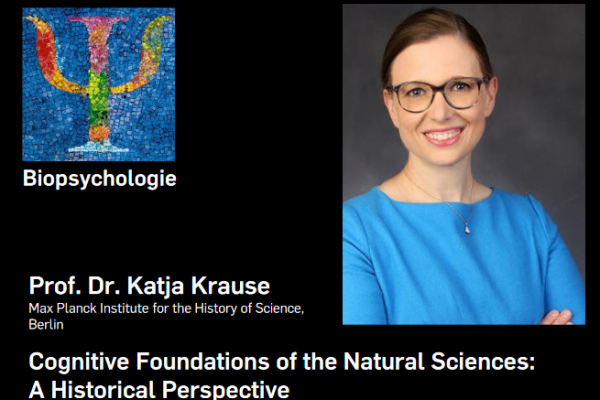2024-11-28

When: December 13th, 2024, at 14 c.t. | Where: IB 4-115 | Zoom: Meeting-ID 666 1535 7896, Password 390776.
Throughout history, conceptions of human cognition have significantly shaped contemporaneous understandings of the natural sciences. Questions such as what the natural sciences aim at, how they are practiced, and what their purposes are have often been answered in light of the images that the cognitive sciences—broadly construed—havecast about our human capabilities and limitations of perception, imagination, and reason. In this talk, I argue that scientists as influential as Aristotle (384-322 BCE), Albert the Great(1200-1280 CE), and Hermann von Helmholtz (1821-1894) shared and practiced this seemingly perennial insight; and I ask whether molding the specific images of human cognition in the cognitive sciences deliberately could co-shape contemporary scientific paradigms.
Short Bio: Katja Krause, professor of the history of science at the Technical University Berlin, leads the Max Planck Research Group “Experience in the Premodern Sciences of Soul and Body” at the Max Planck Institute for the History ofScience. Her research rethinks the relationship between experience and science in the premodern sciences of living beings. She is also interested in the continuities and discontinuities of scientific practices and ideals from premodernity to the present. Among her recent publications are Aquinas on Seeing God (Marquette University Press, 2020) and the edited collections Premodern Experience of the Natural World in Translation (Routledge, 2023) and Contextualizing Premodern Philosophy Explorations of the Greek, Hebrew, Arabic, and Latin Traditions (Routledge 2024). After earning her PhD in philosophy at King’s College London, Katja Krause held postdoctoral fellowships in the history of science at the MPIWG and Harvard University and an assistant professorship in medieval thought at Durham University.
View the PDF file.

When: December 13th, 2024, at 14 c.t. | Where: IB 4-115 | Zoom: Meeting-ID 666 1535 7896, Password 390776.
Throughout history, conceptions of human cognition have significantly shaped contemporaneous understandings of the natural sciences. Questions such as what the natural sciences aim at, how they are practiced, and what their purposes are have often been answered in light of the images that the cognitive sciences—broadly construed—havecast about our human capabilities and limitations of perception, imagination, and reason. In this talk, I argue that scientists as influential as Aristotle (384-322 BCE), Albert the Great(1200-1280 CE), and Hermann von Helmholtz (1821-1894) shared and practiced this seemingly perennial insight; and I ask whether molding the specific images of human cognition in the cognitive sciences deliberately could co-shape contemporary scientific paradigms.
Short Bio: Katja Krause, professor of the history of science at the Technical University Berlin, leads the Max Planck Research Group “Experience in the Premodern Sciences of Soul and Body” at the Max Planck Institute for the History ofScience. Her research rethinks the relationship between experience and science in the premodern sciences of living beings. She is also interested in the continuities and discontinuities of scientific practices and ideals from premodernity to the present. Among her recent publications are Aquinas on Seeing God (Marquette University Press, 2020) and the edited collections Premodern Experience of the Natural World in Translation (Routledge, 2023) and Contextualizing Premodern Philosophy Explorations of the Greek, Hebrew, Arabic, and Latin Traditions (Routledge 2024). After earning her PhD in philosophy at King’s College London, Katja Krause held postdoctoral fellowships in the history of science at the MPIWG and Harvard University and an assistant professorship in medieval thought at Durham University.
View the PDF file.